You'll find relief from seasonal allergies with these 10 potent herbal tea blends, each crafted to target specific allergy symptoms and boost your immune system naturally. Try the Nettle and Peppermint Fusion for its antihistamine properties, or sip on the Ginger Turmeric Allergy Buster to calm your immune response. The Chamomile Lemon Balm Elixir offers a soothing night-time option, while the Rooibos Elderflower Blend provides a caffeine-free alternative. Other powerful combinations include Licorice Root Fennel, Green Tea Quercetin, and Yerba Mate Eucalyptus. These blends offer more than just symptom relief; they're packed with antioxidants and anti-inflammatory compounds to support overall health during allergy season.
Nettle and Peppermint Fusion
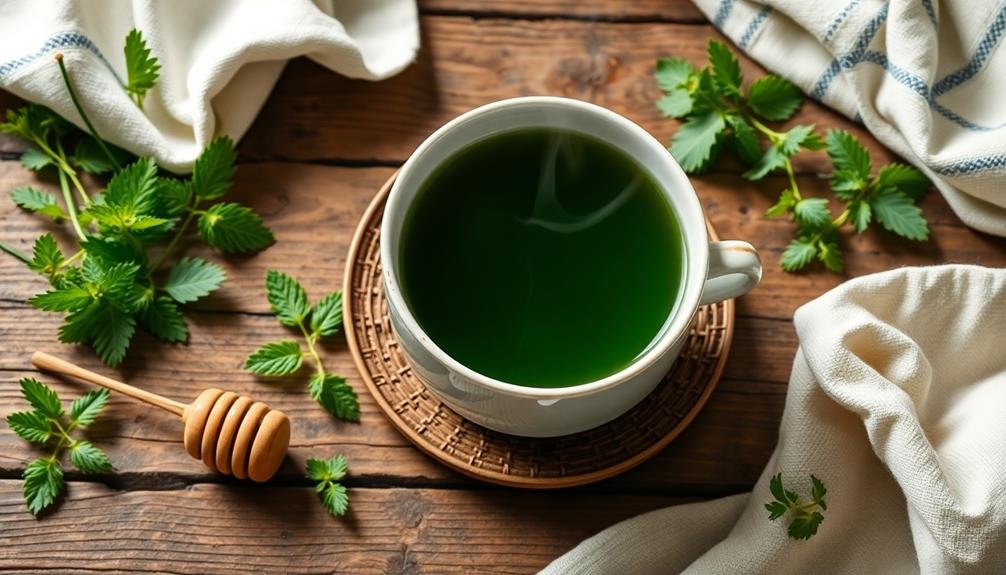
One of the most effective herbal tea blends for allergy relief combines stinging nettle with invigorating peppermint. This powerful duo works synergistically to tackle multiple allergy symptoms. Nettle leaves contain natural antihistamines that help reduce inflammation and minimize allergic reactions. They're also rich in quercetin, a compound known for its ability to stabilize mast cells and prevent the release of histamine.
Peppermint complements nettle's properties by providing a soothing effect on irritated nasal passages and airways. Its menthol content acts as a natural decongestant, helping to clear your sinuses and ease breathing difficulties. Additionally, peppermint's cooling sensation can help relieve headaches often associated with allergies.
To prepare this fusion, steep equal parts dried nettle leaves and peppermint leaves in hot water for 5-10 minutes. You'll want to drink this tea 2-3 times daily during allergy season for maximum benefits. The taste is invigorating and slightly minty, with earthy undertones from the nettle.
If you find the flavor too strong, you can add a touch of honey for sweetness. Remember to consult your healthcare provider before incorporating new herbal remedies into your routine, especially if you're pregnant, nursing, or taking medications.
Ginger Turmeric Allergy Buster
Brimming with anti-inflammatory properties, the ginger turmeric allergy buster is a potent herbal tea blend that can help alleviate allergy symptoms.
This powerful combination targets inflammation in your respiratory system, potentially reducing congestion, sneezing, and itching. Ginger's natural antihistamine effects can calm your overactive immune response, while turmeric's curcumin compound works to suppress allergic reactions.
To make this soothing tea, you'll need:
- 1 inch of fresh ginger root, grated
- 1/2 teaspoon of ground turmeric
- 1 cup of hot water
Simply steep the grated ginger and turmeric in hot water for 5-10 minutes, then strain and enjoy.
For added benefits, you can include a pinch of black pepper to enhance turmeric absorption. Drinking this tea regularly during allergy season may help reduce your reliance on over-the-counter medications.
Chamomile Lemon Balm Elixir
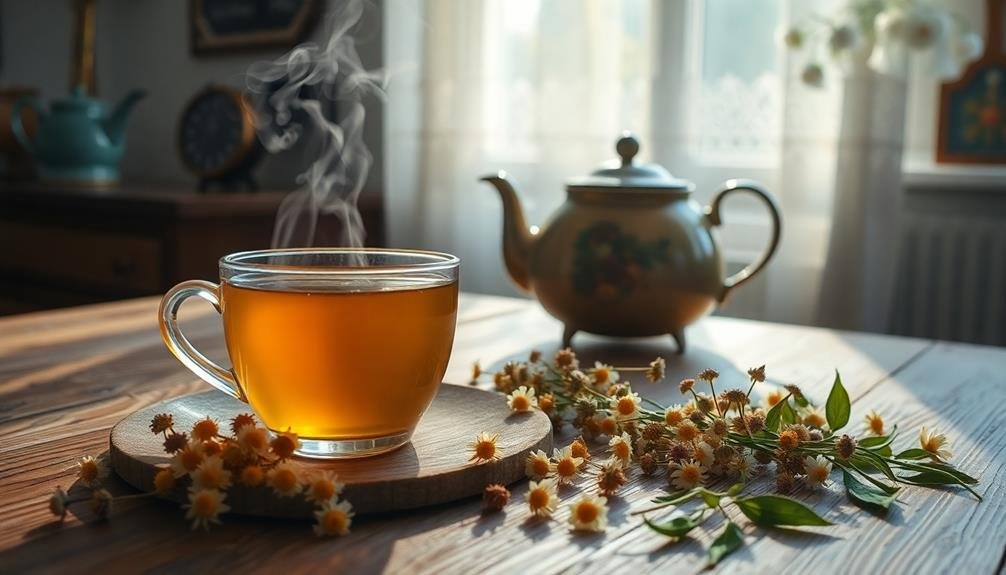
Your chamomile and lemon balm elixir offers a powerful one-two punch against allergy symptoms.
This soothing blend combines chamomile's natural antihistamine properties with lemon balm's calming effects, helping to reduce both physical discomfort and anxiety.
You'll find this relaxing tea particularly beneficial before bedtime, as it can enhance sleep quality while combating nighttime allergy flare-ups.
Soothing Antihistamine Properties
Among the many herbal remedies for allergy relief, the Chamomile Lemon Balm Elixir stands out for its soothing antihistamine properties. This potent blend combines the calming effects of chamomile with the stress-reducing power of lemon balm, creating a synergistic effect that can help alleviate allergy symptoms.
When you drink this elixir, you'll experience its antihistamine properties working to:
- Reduce inflammation in your nasal passages
- Calm itchy, watery eyes
- Ease congestion and promote clearer breathing
The natural compounds in chamomile, such as apigenin and luteolin, act as mild antihistamines, helping to block the release of histamine in your body. This can greatly reduce the severity of allergic reactions.
Lemon balm, with its rosmarinic acid content, further enhances the anti-inflammatory effects, providing additional relief from allergy symptoms.
You'll find that regular consumption of this herbal blend can help stabilize your immune system's response to allergens over time.
Sleep-Enhancing Relaxation Blend
Regularly enjoyed before bedtime, the Chamomile Lemon Balm Elixir serves as a potent sleep-enhancing relaxation blend for allergy sufferers. This soothing combination can help you unwind and drift off to sleep more easily, even when allergies are making you uncomfortable.
Chamomile, known for its calming properties, can reduce anxiety and promote relaxation. Lemon balm complements chamomile by further easing stress and improving sleep quality.
To prepare this elixir, steep one teaspoon each of dried chamomile flowers and lemon balm leaves in hot water for 5-7 minutes. You can add a touch of honey for sweetness if desired. Drink this blend about 30 minutes before bedtime to allow its effects to take hold.
The natural compounds in chamomile and lemon balm work together to gently sedate your nervous system, making it easier to fall asleep and stay asleep throughout the night.
This blend can also help reduce inflammation and ease allergy symptoms, allowing you to breathe more easily as you rest. By incorporating this herbal tea into your nightly routine, you'll likely experience improved sleep quality and wake up feeling more refreshed, even during allergy season.
Rooibos Elderflower Blend
A delightful combination that offers both taste and potential allergy relief is the Rooibos Elderflower blend. This caffeine-free mixture combines the smooth, nutty flavor of rooibos with the subtle floral notes of elderflower.
Rooibos, a South African herb, is rich in antioxidants and may help reduce inflammation associated with allergies. Elderflower, known for its anti-inflammatory properties, can potentially alleviate allergy symptoms like congestion and sinus pressure.
To prepare this soothing blend, you'll need:
- 1 teaspoon of loose rooibos tea
- 1 teaspoon of dried elderflowers
- 8 ounces of hot water
Steep the mixture for 5-7 minutes, then strain and enjoy. You can add a touch of honey for sweetness if desired.
This blend is perfect for sipping throughout the day or before bedtime, as it won't interfere with your sleep. The combination of rooibos and elderflower may help boost your immune system, providing additional support against allergies.
Regular consumption of this blend might contribute to reducing the severity of your allergy symptoms over time. Remember to consult with your healthcare provider before relying on herbal remedies for allergy relief.
Licorice Root Fennel Combo
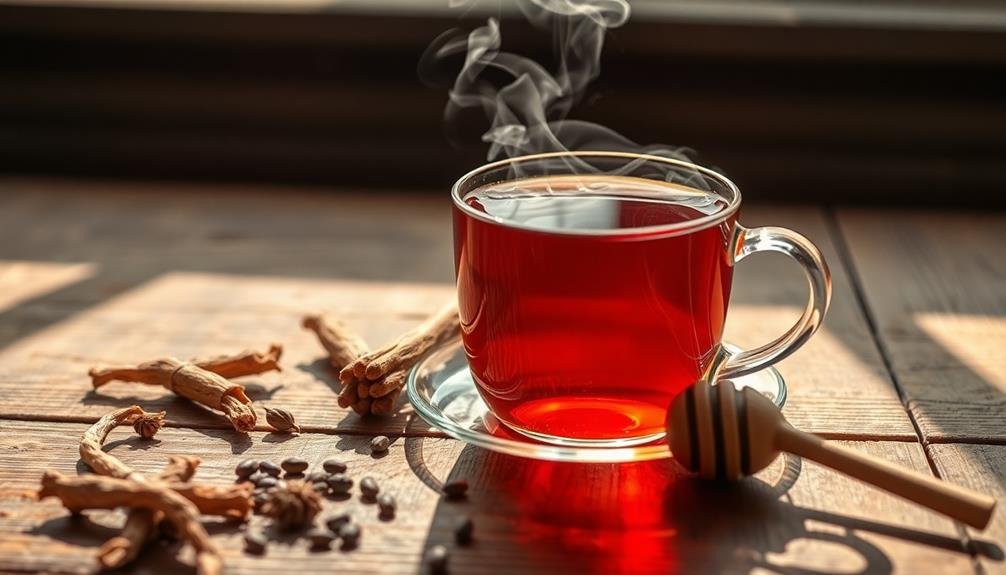
The Licorice Root Fennel Combo offers a potent blend for allergy relief. This powerful duo combines the anti-inflammatory properties of licorice root with the soothing effects of fennel to target allergy symptoms effectively.
Licorice root contains glycyrrhizin, a compound that can help reduce inflammation in your respiratory tract, potentially easing congestion and coughing associated with allergies.
Fennel, on the other hand, is rich in antioxidants and has natural antihistamine properties. It can help alleviate sneezing, itching, and runny nose symptoms. When combined, these herbs create a synergistic effect that may provide more thorough allergy relief than either herb alone.
To prepare this blend, steep 1 teaspoon of dried licorice root and 1 teaspoon of fennel seeds in hot water for 10-15 minutes. Strain and enjoy up to 2 cups daily.
Be cautious with licorice root if you have high blood pressure or are pregnant. It's best to consult your healthcare provider before incorporating this blend into your routine, especially if you're taking medications or have underlying health conditions.
Rosehip Echinacea Immune Booster
While the Licorice Root Fennel Combo targets inflammation, another powerful herbal blend focuses on boosting your immune system to combat allergies.
The Rosehip Echinacea Immune Booster combines two potent herbs known for their ability to enhance your body's natural defenses.
Rosehips, rich in vitamin C, support your immune system and help reduce allergy symptoms. Echinacea, a well-known immune-boosting herb, stimulates the production of white blood cells, which are essential in fighting off allergens.
Together, these herbs create a synergistic effect that can greatly reduce your allergy symptoms and improve overall health.
To make the most of this herbal blend, try the following:
- Steep the tea for 5-7 minutes to extract maximum benefits
- Drink 2-3 cups daily during allergy season
- Combine with local honey for added allergy relief
You'll likely notice a reduction in sneezing, itching, and congestion after regular consumption.
Green Tea Quercetin Mix
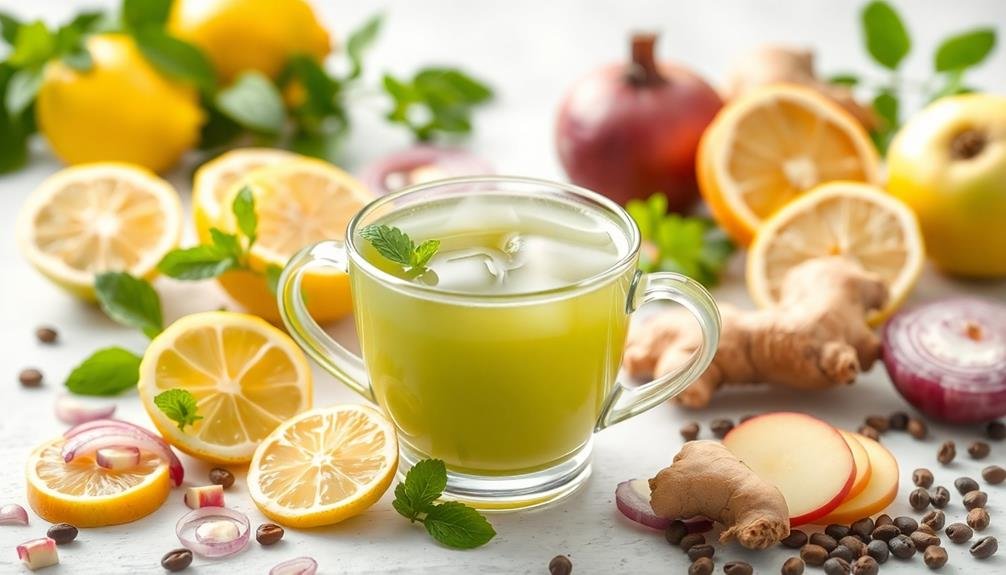
Nature's powerful duo, green tea and quercetin, combine to create a potent allergy-fighting blend. Green tea, rich in antioxidants, helps reduce inflammation and boost your immune system. Quercetin, a flavonoid found in various fruits and vegetables, acts as a natural antihistamine and anti-inflammatory agent.
To prepare this mix, steep high-quality green tea leaves for 3-5 minutes in hot water. While the tea cools slightly, add a quercetin supplement or quercetin-rich foods like apple peels or red onions. Stir well and enjoy this soothing beverage up to three times daily during allergy season.
The catechins in green tea work synergistically with quercetin to inhibit the release of histamines, which trigger allergy symptoms. This combination can help alleviate sneezing, itching, and congestion.
Additionally, the L-theanine in green tea promotes relaxation, potentially easing stress-related allergy flare-ups.
For best results, start drinking this blend a few weeks before allergy season begins. You'll give your body time to build up its defenses against common allergens.
Remember to consult your healthcare provider before adding any new supplements to your routine, especially if you're taking medications.
Yerba Mate Eucalyptus Infusion
Combining the invigorating properties of yerba mate with the soothing effects of eucalyptus, this herbal infusion offers potent relief for allergy sufferers. Yerba mate, a South American herb, is rich in antioxidants and has anti-inflammatory properties that can help reduce allergy symptoms. Eucalyptus, known for its decongestant qualities, helps clear nasal passages and eases breathing.
To prepare this powerful blend, steep one tablespoon of yerba mate and a few eucalyptus leaves in hot water for 5-7 minutes. You can enhance the flavor and benefits by adding a slice of lemon or a teaspoon of honey. Drink this infusion daily, especially during allergy season, to experience its full effects.
This yerba mate eucalyptus infusion provides several benefits for allergy sufferers:
- Boosts immune system function
- Reduces inflammation in nasal passages
- Clears congestion and improves breathing
While this blend can be effective for many, it's crucial to consult with your healthcare provider before incorporating it into your allergy management routine, especially if you're pregnant, nursing, or taking medications.
Holy Basil Thyme Concoction
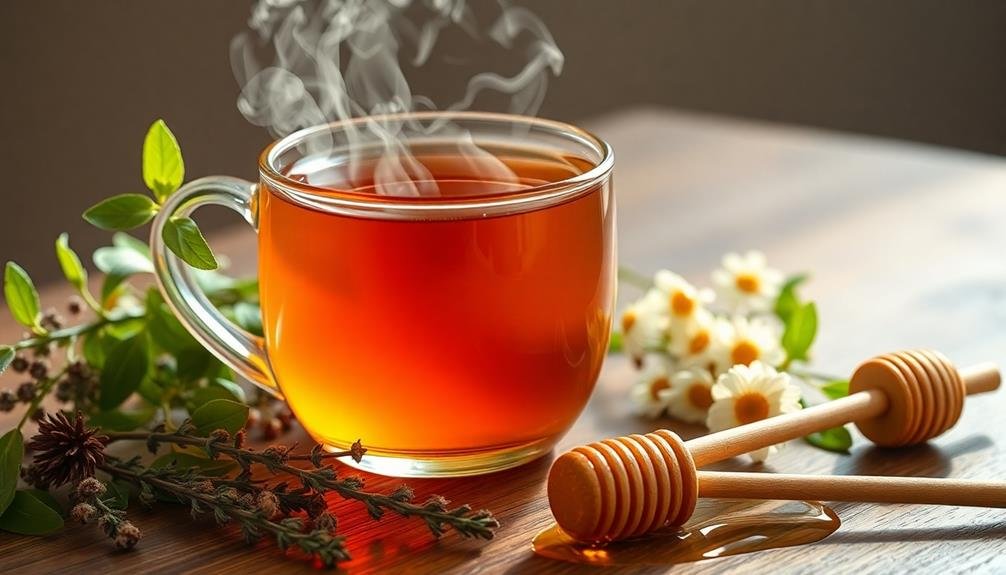
Another powerful herbal blend for allergy relief is the Holy Basil Thyme Concoction. This potent combination harnesses the anti-inflammatory properties of holy basil and the expectorant effects of thyme to combat allergy symptoms effectively. You'll find that this blend helps reduce nasal congestion, soothes sore throats, and eases respiratory discomfort.
To prepare this concoction, steep 1 teaspoon each of dried holy basil and thyme in 8 ounces of hot water for 5-7 minutes. Strain and enjoy up to three times daily. For enhanced flavor and benefits, you can add a slice of lemon and a teaspoon of raw honey.
| Ingredient | Benefits | Flavor Profile |
|---|---|---|
| Holy Basil | Anti-inflammatory | Peppery, clove-like |
| Thyme | Expectorant | Earthy, minty |
| Lemon | Vitamin C boost | Citrusy, tart |
| Honey | Soothes throat | Sweet, floral |
| Hot Water | Hydration | Neutral |
This holy basil thyme concoction not only helps alleviate allergy symptoms but also supports overall immune function. You'll appreciate its warming, comforting taste and the relief it provides during allergy season. Remember to consult your healthcare provider before incorporating new herbal remedies into your routine, especially if you're pregnant, nursing, or taking medications.
Dandelion Goldenrod Allergy Relief
Surprising to some, dandelion and goldenrod team up to create a potent allergy-fighting tea blend. While often mistaken as allergy triggers, these two herbs actually possess anti-inflammatory and antihistamine properties.
Dandelion's natural diuretic effect helps flush out toxins, while goldenrod's astringent qualities soothe irritated sinuses and reduce mucus production.
To brew this powerful combination, steep one teaspoon each of dried dandelion leaves and goldenrod flowers in hot water for 10 minutes. Strain and enjoy up to three cups daily during allergy season.
You'll find this blend particularly effective for:
- Reducing nasal congestion and sinus pressure
- Alleviating itchy, watery eyes
- Easing respiratory discomfort
Don't let the common nature of these plants fool you; their medicinal properties are well-documented.
Dandelion's rich antioxidant content supports overall immune function, while goldenrod's flavonoids help combat seasonal allergies. This tea blend offers a natural alternative to over-the-counter medications, without the drowsiness often associated with antihistamines.
Remember to consult your healthcare provider before incorporating new herbal remedies into your routine, especially if you're pregnant, nursing, or taking medications.
Frequently Asked Questions
How Long Should I Steep Herbal Teas for Maximum Allergy-Fighting Benefits?
You'll want to steep herbal teas for 5-10 minutes to maximize their allergy-fighting benefits. Don't oversteep, as it can make the tea bitter. Experiment with different steeping times to find your perfect balance of flavor and potency.
Can These Tea Blends Be Consumed During Pregnancy or While Breastfeeding?
You should be cautious with herbal teas during pregnancy and breastfeeding. Some herbs can affect your baby. It's best to consult your healthcare provider before consuming any herbal blends to guarantee they're safe for you.
Are There Any Potential Side Effects From Drinking These Herbal Teas Regularly?
You should be aware that regularly drinking herbal teas can have side effects. They might interact with medications, cause allergic reactions, or affect your digestive system. It's best to consult your doctor before consuming them frequently.
How Many Cups of Allergy-Fighting Tea Should I Drink Daily for Best Results?
You'll typically benefit from 2-3 cups of allergy-fighting tea daily. However, it's best to start with one cup and gradually increase. Listen to your body and consult your doctor if you're unsure about the right amount for you.
Can I Combine Multiple Tea Blends or Should I Stick to One Variety?
You can combine multiple tea blends for variety and potential synergistic effects. However, it's best to start with one type and gradually introduce others. Pay attention to how your body reacts and adjust accordingly for ideal results.
In Summary
You've now got an arsenal of powerful herbal tea blends to tackle your allergy symptoms. Don't hesitate to experiment with these combinations to find what works best for you. Remember, consistency is key when using natural remedies. Incorporate these teas into your daily routine, and you'll likely notice a reduction in your allergy symptoms over time. Always consult with your healthcare provider before making significant changes to your allergy management plan.

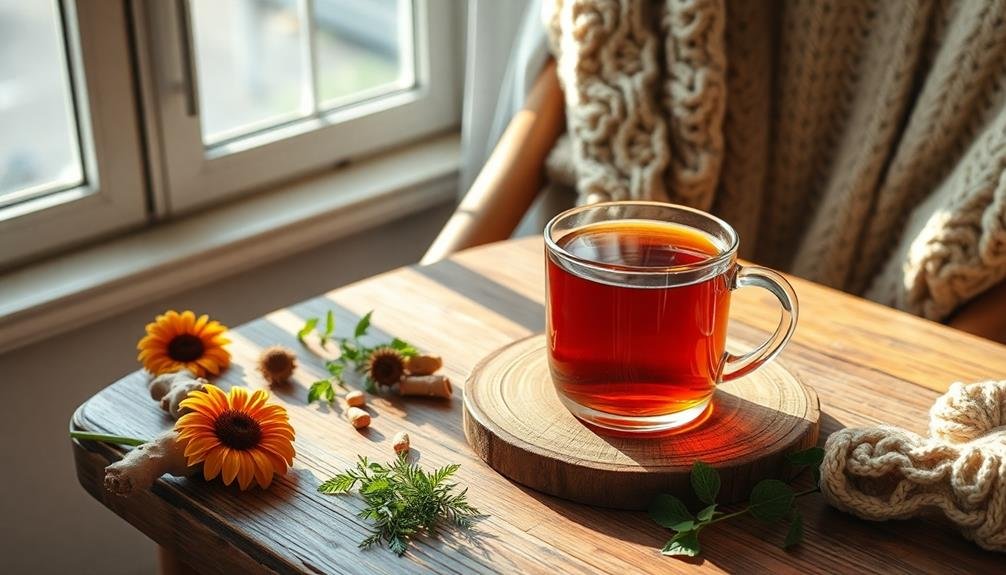



Leave a Reply